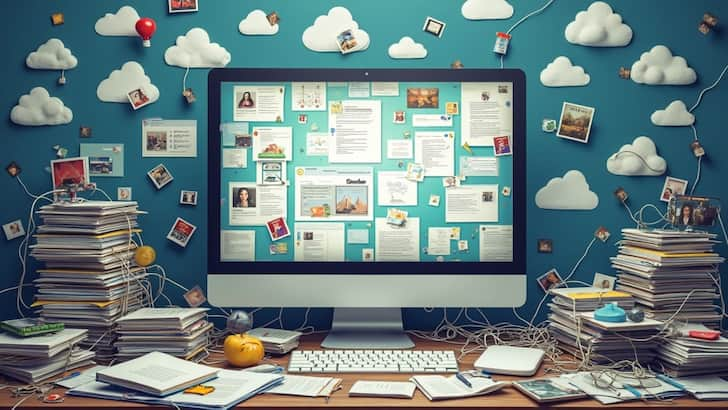I keep thousands of files, photos, emails, and random downloads tucked away across every device I own. Cloud folders, old USB sticks, and my overflowing browser bookmarks tell a story of my digital hoarding habits. If you’re anything like me, you might wonder why it's so hard to let go of old files or why that folder named "Stuff" keeps getting bigger.
I often feel a little embarrassed about how many duplicate photos and half-finished documents I have saved. At the same time, there’s a comfort in knowing I can look back on those files or dig up a receipt from years ago if I really need it. For many people, digital hoarding can start out feeling like good organization, but it can quickly get out of control.
This article is a look at my own digital hoarding confessions, from hanging onto every email to the struggle of cleaning up my downloads folder. I’ll share some reasons why digital clutter can feel so hard to tackle, and offer some tips that have helped me start letting go, when I’m ready. Plus, I’ll dig into the emotional side of digital clutter, and why learning to let go matters for our peace of mind in a fast-moving world.

1. I Save Everything Because "I Might Need It Someday"
One of my biggest reasons for keeping so much digital stuff comes down to fear. What if I delete a file I’ll need again? Whether it’s an old resume, a project from college or screenshots of something I found funny, I usually convince myself it’s safer to keep it.
Most of the time, I never look at these files again. But the idea of losing something feels worse than the clutter. It feels like tossing out spare keys that don’t open any lock I own, just in case I bump into the door someday.
What Helps:
- I ask myself if I’ve used the file in the last year. If not, there’s a good chance I won’t miss it.
- I use cloud backup for things that feel really important, so I know they’re safe even if I delete a copy from my computer.
- When I really don't know, I move the file to an "Archive" folder with a clear date, making it easy to find later if I ever actually need it.
2. My Photo Gallery Is Out of Control
Every trip, special event or new recipe means dozens of new photos on my phone. I’m great at taking pictures but terrible about deleting bad ones. I still have screenshots of memes I sent once and never looked at again.
My feeling is that photos capture moments I’ll want to remember. But when I scroll back to old photos, I get overwhelmed by the sheer volume. Sometimes I find ten versions of the same plant or coffee cup from years ago.
What Helps:
- I try picking a few favorites after every event and deleting the rest.
- Some apps help me spot duplicates and blurry photos automatically, making it easier to tidy up.
- Once a season, I set aside an evening to relive memories while also making space by cleaning out the gallery.
3. My Inbox Is a Catch-All

Emails pile up fast. Every promo, work thread and notification adds to the stack. I hold onto everything because I worry about missing bills, receipts or messages from someone important.
The result is folders full of unread newsletters and a search bar that’s the only way I find anything. Unsubscribing from lists feels like a chore. Sometimes, I use star or archive features, but it’s easy to slip back into clutter.
What Helps:
- Filters and rules help me organize newsletters and updates automatically.
- Unsubscribing when I see an email I no longer want helps prevent future buildup.
- I set aside a short "Inbox Zero" session once a week to handle anything I missed or left for later.
4. My Desktop Is My To-Do List
My computer desktop is usually packed with shortcuts and files I drag there to "handle later." For me, it's a way to keep things I don’t want to forget visible, but after a while it’s just a wall of clutter.
I treat my desktop as temporary storage, but it never really gets cleaned off. Instead, things pile up until I can’t find what I need, making me more likely to forget about important tasks.
What Helps:
- I set a calendar reminder every month to clear out the desktop.
- I create folders for common categories like "Work" or "Receipts" to group files before moving them to more permanent storage.
- Regularly using the "Sort by" option helps me quickly spot what hasn't been touched in weeks.
5. My Download Folder Is a Black Hole
Everything from PDFs, random zip files and software installers falls into my downloads folder. I almost never clean it out, and forget what’s even in there. Sometimes I find copies of files I redownloaded because I couldn’t remember the first one existed.
This digital junk drawer always grows unless I set aside time to clean it. Otherwise, it becomes impossible to find what I need without a search. Sometimes I wonder what surprises I’ll stumble upon every time I dare to open it.
What Helps:
- A scheduled “downloads day” helps me clear things I no longer need.
- I sort by file type or date when cleaning, which makes the process faster.
- Turning on notifications to delete files older than a certain date helps prevent endless pileup.
6. I Struggle With Letting Go of Old Projects

Old presentations, school assignments, and even drafts of emails I never sent fill my hard drive. Some of these are sentimental; others just seem too "finished" to delete, even if I know I’ll never touch them again.
Deleting hours of work feels hard, even if the work is outdated or no longer relevant. I still have folders from jobs I left years ago and I don’t always know what I’m keeping them for. The digital footprints symbolize milestones, even if their practical use is long gone.
What Helps:
- I keep a "Greatest Hits" folder for my best work so I can delete the rest without losing important memories or examples.
- Reminding myself that digital clutter slows me down when I actually need to find something helps me let go.
- For sentimental old files, I keep only pieces I’m proud of or that make me smile, and let go of the rest.
7. Backups Multiply My Mess
I use backups to keep my files safe, but sometimes I end up with backups of backups. Old hard drives, flash drives and cloud syncs get out of sync and copy the same mess everywhere. Instead of peace of mind, I just get more digital clutter to manage.
This habit means I keep devices and files "just in case," even when they're outdated or corrupted. I rarely revisit old backups, but deleting them feels risky. Occasionally, old backups take up significant space and make me hesitant to deal with what looks like a technical headache.
What Helps:
- I label backup drives clearly with dates and contents so I know what’s important.
- When upgrading devices, I try to transfer only active projects and essential media.
- Adopting a simple versioning system makes it easy to know which backups to keep and which are safe to erase.
8. Bookmarks and Saved Links Never End
Every time I find a helpful article or recipe, I bookmark it “for later.” Over time, my browsers fill with hundreds of links I rarely revisit. I keep thinking the day will come when I go back and read or try all those things, but it rarely happens.
Organizing bookmarks doesn’t come naturally to me, and old links break or become irrelevant. The clutter weighs on my mind anytime I try to find something useful buried in lists. Occasionally, I rediscover useful links I wish I’d found sooner, which makes sorting feel both necessary and a little fun.
What Helps:
- I create folders for regular topics (like “Recipes” or “Tech Tips”) and move bookmarks into them.
- Every few months, I go through and delete links I know I won’t use.
- If a link is really valuable, I save a note explaining why it matters so I remember later.
9. I Can’t Stop Collecting Apps

I’m always looking for new ways to hack my productivity or try out nextlevel cool software. The problem is, whenever I see a promising app, I download it, just to see if it lives up to the hype. Most of these apps end up unused, but I usually forget to delete them.
Unused apps take up space, send notifications and add to update alerts I ignore. My phone and PC both have pages of icons for programs I might never open again. There’s a certain thrill in testing new tech, but it often leads to an app graveyard.
What Helps:
- I uninstall any app after a month if I’m not using it regularly.
- Making a habit of organizing apps into a “Try Later” folder helps remind me to actually test and decide.
- Leaving short reviews or notes after trying an app helps me remember if it was worth keeping or not.
10. Cloud Storage Just Means Hiding the Mess
Cloud drives give me a sense of safety because my files are “off my device,” but it doesn’t solve the problem. My Google Drive and Dropbox both hold way too many files, and searching through them is just as overwhelming as sorting through my computer.
Digital hoarding can feel even easier with cloud storage because it creates the illusion of unlimited space. Instead of deleting, I just move clutter online. This can slow down sync times and make sharing files difficult in the future; occasionally, it makes me anxious when I need to find something in a hurry.
What Helps:
- Every quarter, I schedule a cleanup session just for my cloud drives.
- Saving a simple folder structure helps me see what’s actually important and delete what’s not.
- Using search and filters by file type or date makes sifting through the digital pile a little less intimidating.
Why Digital Hoarding Is So Easy to Fall Into
I’ve noticed that digital clutter doesn’t get in the way as much as physical clutter, at least until something breaks or space runs out. Technology makes it easy to save everything with almost no limit, and the habit just builds over time.
Sometimes, my digital hoarding is about nostalgia. Other times, it’s about feeling productive or safe. In some cases, it just happens because deleting and organizing takes time and focus I don’t always have. It’s easy for the digital mess to grow unnoticed when you don’t feel the weight of it in your everyday life.
Cleaning digital clutter often feels like work with no payoff. The clutter is out of sight most of the time, so it’s easy to ignore. But I know from experience that finding a lost document or finally clearing out junk brings a sense of relief and makes my digital life easier to manage. It’s not always dramatic, but these small victories make my digital space feel a bit lighter and my mind more at ease.
How I’m Learning to Let Go
I’m still working on my digital hoarding habits, and I know progress will be slow. Whenever I sort files, I ask if keeping them serves a real purpose or just adds to my mental logjam. I set small, regular reminders for digital cleanups instead of trying to do everything at once.
Getting organized helps me be less stressed about losing files and actually frees up space on my devices. It also makes me more thoughtful about what I choose to save from now on. Over time, these habits have started to take up a spot in my routine, just like cleaning my home or sorting mail.
If you recognize yourself in any of these confessions, you’re not alone. Digital hoarding is really common in a world where information is always just a click away. Taking small steps to clean up your digital space can make a big difference, and sometimes, just acknowledging the mess is the first move in the right direction. Wrapping up, it’s important to remember that digital clutter is manageable—even for those of us who tend to keep everything “just in case.”
How I "Finally" Make Over $7,000 Monthly Income
"The most valuable thing I've ever done!"
